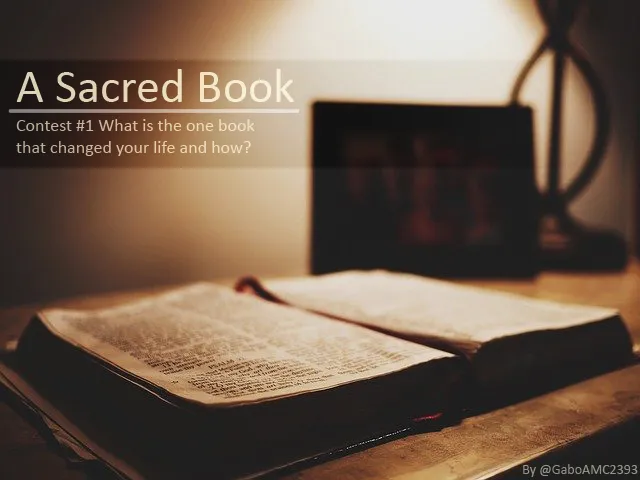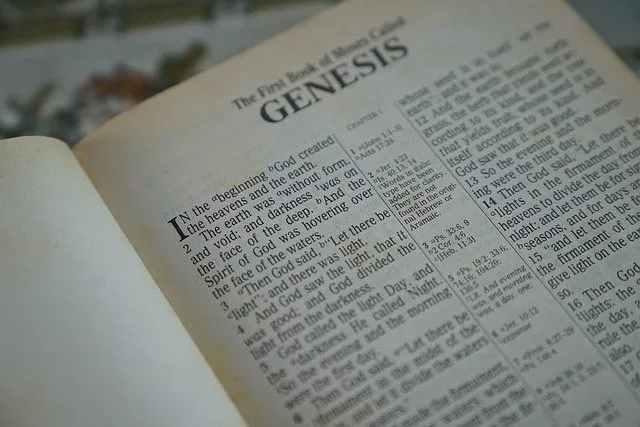
(Abajo está la versión en español)
Greetings to all! This time I am going to share with you my opinion about a book that has influenced my life quite a bit, as well as the lives of many other people. This is my participation in the "contest #1 What is the book that changed your life and how?" of the Hive Book Club community. In this contest I've seen a variety of books, but it struck me that no one has even made mention of the book I'll discuss below.

Nowadays we have a great number of works, of different types of authors, from different eras and diverse cultures. Many may have positive effects on us, while others may awaken certain not so positive feelings; however, I will not give my opinion of a single book, but of a collection of books. Although many people consider it as a single book, the truth is that it is a compendium of sixty-six books and letters, being one of the oldest books in human history. I am referring, of course, to the Bible.

I clarify from now on that this will not be a publication of a religious nature, I will focus on other aspects that I find interesting in this work of literature. Having said that, I continue...
Many people have a bible at home but probably have not read it because they consider it a difficult book to digest and understand, especially because it lends itself to controversial interpretations and generates much debate; however, because of its many stories and characters, as well as advice and lessons learned, I consider that I must place it as the book that has most influenced my life, without detracting from other great works I have read.
Now, when we read a text, it can come to life if we really get involved in the story. Its characters become so real to us, to the point of empathizing deeply with them, awakening different emotions according to the experiences of each one. Biblical stories are no exception, as many of their characters face many things, from everyday problems such as not having food, to catastrophic problems such as a universal flood or the total destruction of a couple of cities.

But before we talk about the biblical stories, let's have some context. The Bible is divided into different sections. There are the first five books, Genesis, Exodus, Leviticus, Numbers and Deuteronomy, known as the Pentateuch; then come the historical books, such as the books of Kings, Chronicles, Ezra or Nehemiah; then the poetic books, such as the Psalms or Proverbs; finally the prophetic books, such as the books of Isaiah, Jeremiah, Daniel, or those commonly known as the 12 minor prophets. This is as far as the Hebrew-Aramaic scriptures, also known as the Old Testament. This is followed by the Christian Greek scriptures, also known as the New Testament. Here we find the four gospels, Matthew, Mark, Luke and John; the Acts of the Apostles, written by Luke; then the letters of Paul, such as the letter to the Romans, the Galatians or the Ephesians; almost at the end is the letter of James and the three letters of John; then we find the last book of the Bible, the prophetic book of Revelation or Apocalypse, written by the apostle John. As you can see, it is quite an extensive book, so I will approach the subject in parts.

Regarding the first five books of the Bible, in these we find stories such as the universal flood, the seven plagues of Egypt, among others. Particularly, from chapter 13 of Genesis, the story of Abraham and his nephew Lot is narrated, where the destruction of the cities of Sodom and Gomorrah is also narrated. These are stories of survival in which people have to make difficult decisions, perhaps ones we have never faced before, in which their lives are at stake. I remember the case of Lot's wife, who was commanded not to look back during her flight from Sodom and Gomorrah as these cities were destroyed. This woman turned and instantly became a statue of salt. Reading the story, one might think it was foolish to turn away, but putting yourself in the woman's shoes, imagine being told that you must flee your home and leave everything behind as the city is destroyed in fire and brimstone; you must flee without looking back, with destruction at your heels and devastating everything that once belonged to you. Would you have the willpower not to turn away? It's interesting, because thinking about each character's circumstances and putting yourself in their shoes makes you see the story in a real way, as if you were watching one of these apocalyptic movies or something.

I particularly like poetic books, especially the books of Job and Ecclesiastes. Maybe you have heard of the book of Job, maybe not, but from this book I would like to mention the appearance on the scene of the "villain" of the whole story, Satan the Devil. In chapter 2 it is told that the angels were gathered with God, then Satan arrived. It is interesting the exchange of words between God and Satan. The latter spoke about Job, a man obedient to God who was a victim of the devil's slander. One of these slanders was the one he said to God next, "for a change, reach out your hand, and touch even his bone and his flesh, and see if he will not curse you to your very face." Assuring that, if God stopped protecting Job, this faithful man would curse God. It is interesting to me because it shows the insolence of Satan, something very characteristic of this antagonist, to call him in some way. With stories like this, I learned to visualize the scenarios and characters, creating in me the habit of not reading without thinking, but with meaning and vividly. Moreover, it was my first contact with a poetic style text.

Ecclesiastes, on the other hand, was written by the wise King Solomon. In its first chapters, he devotes himself to an analysis of his own work in order to try to find the meaning of life. Thanks to the reflections found in the later chapters, we see that it is necessary to value friendships, to value work and to dedicate the necessary time to each activity, since at the beginning of chapter 3 of this book it is clearly stated that there is time for everything, an important lesson for anyone who says that he never has time for anything. Something that I extracted from this story is an important lesson that is in chapter 5, I quote: "Sweet is the sleep of the laborer, whether he eats little or much, but the abundance of the rich will not let him sleep". I found this to be particularly true, because when I observed people with a lot of money, I realized that they do not fully enjoy their money, on the contrary, they live worried about making more and not losing what they already have. This showed me that it is necessary to have a balanced view of money. At the end of chapter 11, Solomon advises young people to make the most of their youth, since it is fleeting. Then he describes in a poetic way everything that happens when a person begins to age. Keeping these things in mind helped me to be a little more focused on my youth, on accomplishing my goals and understanding that nothing lasts forever, especially life, which we have today and don't know tomorrow.
And I could go on commenting on the many stories in the Bible, such as the one found in the book of Ruth, where the tragic story of Ruth and Naomi is narrated; the unbreakable friendship between David and Jonathan, recorded in the 1st book of Samuel; the evils faced by the people of Israel when the Babylonians destroyed Jerusalem, recorded in the book Lamentations; the life of Jesus recorded in the Gospels and the terrible death he suffered; the tireless work of the apostle Paul and the graphic prophecies found in the book of Revelation. All are stories that can move us and make us see the world differently, influencing us in one way or another. However, the bible is more than a book with "good stories", it is a book where we find a lot of advice. If people would follow this advice, religious or not, I am sure they would do much better. Let's take for example the case of spouses. Nowadays domestic violence is a widespread problem all over the world. In most cases, it is the man who mistreats his wife, either verbally or physically; but think of these words in the Bible: "Husbands ought to love their wives as their own bodies. The man who loves his wife loves himself, for no one has ever hated his own body, but nourishes and cherishes it" (Ephesians 5: 28 and 29). If husbands would put this into practice, loving their wives as their own bodies, the cases of domestic violence would perhaps decrease.

Undoubtedly, this is a book that influenced me for good, as it taught me many values from a very young age and the good habit of reading, a habit that not many have these days. As I said, I think this book should be here as a book that changed my life.

Thank you for this wonderful contest and for the excellent publications of the other participants. It's a contest that makes you think, because when you've read so many books, it's hard to choose one that has really changed your life, so congratulations for the contest and I encourage you to keep it up, making this wonderful community grow. I haven't been on Hive for long, but as far as I'm concerned, I'll be around to support as I can. Well, I hope you liked the post, I'll say goodbye....
See you next time!
*****Versión en Español*****

¡Saludos a todos! En esta ocasión voy a compartir con ustedes mi opinión acerca de un libro que ha influido bastante en mi vida, al igual que en la vida de muchas otras personas. Esta es mi participación en el “concurso #1 ¿Cuál es el libro que cambió su vida y cómo?” de la comunidad Hive Book Club. En este concurso he visto variedad de libros, pero me llamó la atención que nadie haya hecho siquiera mención del libro que comentaré a continuación.

En la actualidad contamos con una gran cantidad de obras, de distintos tipos de autores, de distintas épocas y diversas culturas. Muchos pueden tener efectos positivos en nosotros, mientras que otros pueden despertar ciertos sentimientos no tan positivos; sin embargo, yo no daré mi opinión de un solo libro, sino de una colección de libros. Aunque muchas personas lo consideran como un libro único, lo cierto es que es un compendio de sesenta y seis libros y cartas, siendo uno de los libros más antiguos de la historia humana. Me refiero, desde luego, a la Biblia.

Aclaro desde ahora que esta no será una publicación de índole religiosa, me enfocaré en otros aspectos que me parecen interesantes de esta obra de la literatura. Dicho esto, continúo...
Muchas personas tienen una biblia en casa pero es probable que no la hayan leído por considerarlo un libro difícil de digerir y entender, sobre todo porque se presta a interpretaciones polémicas y que generan mucho debate; sin embargo, a causa de sus muchas historias y personaje, además de consejos y lecciones extraídas, considero que debo colocarlo como el libro que más ha influido en mi vida, sin restarle mérito a otras grandes obras que he leído.
Ahora bien, cuando leemos un texto, este puede cobrar vida si realmente nos involucramos en la historia. Sus personajes llegan a ser tan reales para nosotros, hasta el punto de empatizar profundamente con ellos, despertando distintas emociones según las vivencias de cada uno. Las historias bíblicas no son la excepción, pues muchos de sus personajes se enfrentan a muchas cosas, desde problemas tan cotidianos como no tener alimento, hasta problemas tan catastróficos como un diluvio universal o la destrucción total de un par de ciudades.

Pero antes de hablar de las historias bíblicas, tengamos un poco de contexto. La Biblia está dividida en distintas secciones. Están los primeros cinco libros, Génesis, Éxodo, Levítico, Números y Deuteronomio, conocidos como el pentateuco; luego entran los libros históricos, como los libros de los Reyes, las Crónicas, Esdras o Nehemías; a continuación los libros poéticos, como los Salmos o Proverbios; finalmente los libros proféticos, como los libros de Isaías, Jeremías, Daniel, o los comúnmente conocidos como los 12 profetas menores. Hasta aquí llegan las escrituras hebreoarameas, también conocidas como el antiguo testamento. Le siguen las escrituras griegas cristianas, también conocidas como el nuevo testamento. Aquí encontramos los cuatro evangelios, Mateo, Marcos, Lucas y Juan; los Hechos de los apóstoles, escrito por Lucas; luego las cartas de Pablo, como la carta a los Romanos, a los Gálatas o lo Efesios; casi al final está la carta de Santiago y las tres cartas de Juan; luego encontramos el último libro de la Biblia, el libro profético de Revelación o Apocalipsis, escrito por el apóstol Juan. Como pueden ver, es un libro bastante extenso, por eso abordaré el tema por partes.

En lo que respecta a los primeros cinco libros de la Biblia, en estos encontramos historias como la del diluvio universal, las siete plagas de Egipto, entre otras. Particularmente, a partir del capítulo 13 de Génesis, se narra la historia de Abrahán y su sobrino Lot, donde también se narra la destrucción de las ciudades de Sodoma y Gomorra. Son historias de supervivencia en las que las personas deben tomar decisiones difíciles, tal vez a las que nunca nos hemos enfrentado, en las que su vida se ven juego. Recuerdo el caso de la esposa de Lot, a quien se le ordenó no mirar hacia atrás durante su huía de Sodoma y Gomorra, mientras estas ciudades eran destruidas. Esta mujer volteó y se convirtió instantáneamente en una estatua de sal. Al leer la historia, uno podría pensar que fue una tontería voltear, pero al ponernos en el lugar de la mujer, imagínense que les dicen que deben huir de su hogar y dejar todo atrás mientras la ciudad es destruida en fuego y azufre; ustedes deben huir sin mirar atrás, con una destrucción pisándole los talones y devastando todo lo que alguna vez les perteneció. ¿Tendrían la fuerza de voluntad para no voltear? Es interesante, porque pensar en las circunstancias de cada personaje y ponerse en su lugar te hace ver la historia de manera real, como si estuvieras viendo una de estas películas apocalipticas o algo así.

A mi particularmente me gustan los libros poéticos, especialmente los libros de Job y el de Eclesiastés. Tal vez han escuchado del libro de Job, tal vez no, pero de este libro me gustaría hacer mención de la aparición en escena del “villano” de toda la historia, Satanás el Diablo. En el capítulo 2 se cuenta que estaban los ángeles reunidos con Dios, luego llegó Satanás. Es interesante el intercambio de palabras que hay entre Dios y Satanás. Este último habló acerca de Job, un hombre obediente a Dios que fue víctima de las calumnias del diablo. Una de estas calumnias fue la que le dijo a Dios a continuación: “para variar, sírvete alargar la mano, y toca hasta su hueso y su carne, y ve si no te maldice en tu misma cara”. Asegurando que, si Dios dejaba de proteger a Job, este hombre fiel maldeciría a Dios. Me resulta interesante porque se aprecia la insolencia de Satanás, algo muy característico de este antagonista, por llamarlo de alguna manera. Con historias así, aprendí a visualizar los escenarios y los personajes, creando en mí el hábito de no leer sin pensar, sino con sentido y de manera vívida. Además, fue mi primer contacto con un texto de estilo poético.

Eclesiastés, por otra parte, fue escrito por el sabio rey Salomón. En sus primeros capítulos, se dedica a hacer un análisis a su propio trabajo para tratar de encontrar el sentido de la vida. Gracias a las reflexiones que se encuentran en los capítulos posteriores, vemos que hay que valorar las amistades, valorar el trabajo y dedicar el tiempo necesario a cada actividad, ya que al comienzo del capitulo 3 de este libro se expone claramente que para todo hay tiempo, una lección importante para todo el que dice que nunca tiene tiempo para nada. Algo que extraje de esta historia es una importante lección que está en el capítulo 5, cito textualmente: "Dulce es el sueño del trabajador, sea que coma poco o mucho, pero la abundancia del rico no lo deja dormir". Encontré esto particularmente cierto, ya que al observar a personas con mucho dinero, me di cuenta que no disfrutan plenamente su dinero, por el contrario, viven preocupados en hacer más y en no perder lo que ya tienen. Esto me mostró que hay que tener un punto de vista equilibrado del dinero. Finalizando el capítulo 11, salomón aconseja a los jóvenes aprovechar la juventud, ya que esta es pasajera. Luego describe de manera poética todo lo que sucede cuando una persona comienza a envejecer. Tener presente estas cosas me ayudó a ser un poco más centrado en mi juventud, en cumplir las metas propuestas y entender que nada es eterno, sobre todo la vida, que hoy tenemos y mañana no sabemos.
Y podría seguir comentando las muchas historias que tiene la Biblia, como la que se encuentra en el libro de Rut, donde se narra la trágica historia de Rut y Noemí; la inquebrantable amistad que hubo entre David y Jonatán, registrada en el 1er libro de Samuel; los males que afrontó el pueblo de Israel cuando los babilonios destruyeron Jerusalén, registrados en el libro Lamentaciones; la vida de Jesús registrada en los evangelios y la terrible muerte que sufrió; la incansable labor del apóstol Pablo y las gráficas profecías encontradas en el libro de apocalipsis. Todas son historias que pueden conmover y hacer que veamos el mundo de manera distinta, influyendo en nosotros de alguna u otra manera. Sin embargo, la biblia es más que un libro con “buenas historias”, es un libro donde encontramos muchos consejos. Si las personas siguieran estos consejos, sea religioso o no, estoy seguro de que les iría mucho mejor. Pongamos por ejemplo el caso de los esposos. Hoy en día la violencia doméstica es un problema extendido por todo el mundo. En la mayoría de los casos, el hombre es quien maltrata a su esposa, ya sea verbal o físicamente; pero piense en estas palabras que están en la Biblia: “Del mismo modo, los esposos deben amar a sus esposas como a sus propios cuerpos. El hombre que ama a su esposa se ama a sí mismo, porque nadie ha odiado jamás su propio cuerpo, sino que lo alimenta y lo cuida con cariño” (Efesios 5: 28 y 29). Si los esposos pusieran esto en práctica, amar a sus esposas como a sus propios cuerpos, los casos de violencia doméstica tal vez disminuirían.

Sin duda, este es un libro que influyó en mí para bien, ya que me enseñó muchos valores desde muy chico y el buen hábito de la lectura, un hábito que no muchos tienen en estos tiempos. Como dije, pienso que este libro debía estar aquí como un libro que cambió mi vida.

Agradezco por este maravilloso concurso y por las excelentes publicaciones de los otros participantes. Es un concurso que te hace reflexionar, porque cuando has leído tantos libros, se hace difícil elegir uno que realmente haya cambiado tu vida, así que felicitaciones por el concurso y los animo a que sigan así, haciendo crecer esta maravillosa comunidad. No llevo mucho tiempo en Hive, pero en lo que a mi respecta, estaré por acá apoyando como pueda. Bien, espero que les haya gustado la publicación, me despido…
¡Hasta la próxima!

Imagen principal editada con Photoshop (Original)
Traducido con DeepL
Main image edited with Photoshop (Original)
Translated with DeepL
Últimos tres post/Last three posts:
Weekend in my vegetable garden / Fin de semana en mi huerto
Eggplant, friend or foe? / Berenjena ¿amiga o enemiga?
Mi restaurante de madera / My wooden restaurant
